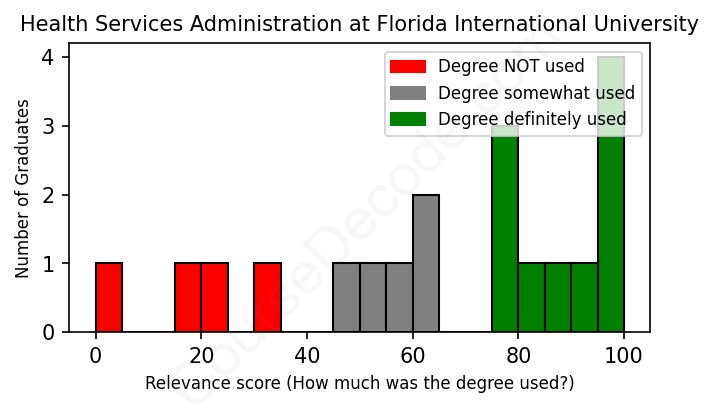
First, some facts. Of the Health Services Administration graduates from Florida International University we've analyzed , here's how many have used (or NOT used) their degree in their career:

These are estimates based on AI analysis of 19 LinkedIn profiles (see below).
The verdict? Slightly below average. Overall, with an average relevance score of 65%, Health Services Administration graduates from Florida International University have a slightly lower likelihood (-2%) of finding work in this field compared to the average graduate across all fields:
And for comparison, here's the chart for all profiles we've looked at across all degrees.
Also, after graduating, 42% of these graduates have pursued further education other than another Bachelor's degree (such as a Masters degree or other), compared to the average across all profiles of 35%. This suggests you may need more than just a Bachelors degree to be competitive as a Health Services Administration graduate.
See the details:
|
Relevance score: 77% We think this person has gone into a career highly relevant to their degree. We think this person has gone into a career highly relevant to their degree.
DEGREE INFOGraduated in 2013 from Florida International University with a Bachelor of Science (B.S.) in Health Services Administration. Also pursued further education since (see below). JOB HISTORY SINCE GRADUATIONClinical Administrative Coordinator UnitedHealth Group Jun 2014 - Apr 2018 Service Account Manager  UnitedHealth Group Apr 2018 - Oct 2022 Quality Administrative Coordinator  UnitedHealth Group Oct 2022 - Present FURTHER DEGREES DONE SINCE GRADUATINGMaster of Business Administration (MBA)Florida International University 2015 - 2016 Doctor of Nursing Practice Florida Atlantic University 2023 - 2026 ABOUTNo information provided. |
The top 10 most common jobs done by the graduates we've analyzed (ranked most common to least) are:
After analyzing the job paths of graduates from Florida International University's Health Services Administration program, it becomes clear that there are a variety of roles taken up by alumni. A chunk of these jobs, especially those in the earlier years, appear to stray away from core health services principles. Many graduates have worked in roles like event staff, production assistants, or even as library assistants, which generally do not tap into the specific knowledge or skills tied to health administration. However, it's worth noting that positions such as Clinical Administrative Coordinators or Healthcare Advocates emerge for graduates fairly consistently, showcasing a more suitable application of their education. These roles emphasize management and operational responsibilities within healthcare settings, directly linking back to the degree's core focus.
While many graduates hold jobs that have only a loose connection to Health Services Administration, there are notable exceptions where alumni have stepped into highly relevant positions. For instance, roles like Legal Nurse Consultant, Project Manager, and Quality Administrative Coordinator are clear examples where graduates employ their education directly. This contrasting picture highlights that while some graduates might find themselves in roles that aren't specifically aligned with their degree, others are indeed taking advantage of their studies in impactful positions that revolve around healthcare management and services. Overall, it seems there’s a mix of job relevancy: some hit that sweet spot of being directly applicable to health services, while others might feel like a leap away from the core competencies learned during their studies.
Here is a visual representation of the most common words in job titles for Health Services Administration graduates (this is across all Health Services Administration graduates we've analyzed, not just those who went to Florida International University):

Looking at the career paths of graduates from Florida International University with a degree in Health Services Administration, it seems like most of them have managed to land jobs that are fairly relevant to the field right after graduation. In the early years following their degree, many start out in positions like administrative roles, healthcare coordination, and even nursing. For example, graduates from 2013 have transitioned into roles as registered nurses, while some from 2015 have taken on healthcare advocacy or administrative roles right off the bat. It looks like their first jobs closely relate to health services, which is a good sign that the program prepares them well for the job market.
Fast forward to five or ten years down the line, many of these grads continue to climb the ladder within healthcare organizations or related industries. Several have moved into managerial or supervisory roles, showing that they’re making steady progress in their careers. For instance, one graduate went from being a patient representative to director of strategic projects within eight years, which is definitely impressive. While there are a few examples of folks straying into unrelated areas like legal work or media, the majority seem to stick with the health services sphere and expand their expertise over time. Overall, it appears that many graduates have found success and advancement in careers that align with their studies in Health Services Administration, which is really reassuring for anyone considering this degree.
Honestly, a Bachelor’s degree in Health Services Administration can be pretty manageable, especially if you have a genuine interest in the health field and organized management. At Florida International University, it’s designed to be accessible for a wide range of students, so you’ll find a mix of challenging coursework and some classes that are more straightforward. You’ll tackle subjects like healthcare policies, management principles, and maybe some stats, but as long as you stay on top of your assignments and keep up with readings, it’s definitely do-able. It’s not as intense as some STEM programs, but it still requires effort and a bit of commitment to really understand the material. So if you’re motivated, you should be fine!
Most commonly, in the LinkedIn profiles we've looked at, it takes people 2 years to finish a Bachelor degree in Health Services Administration.
When you look at the job histories of these Health Services Administration graduates from FIU, it seems like most of them have been able to gradually work their way up in their careers, which is a good sign for earning potential. The ones who graduated in 2013, for instance, started as registered nurses and moved into higher roles like Legal Nurse Consultant, showing they’re likely making decent cash now. Similarly, many graduates from 2015 and 2016 ended up in management and oversight roles, which typically come with better pay. There are a few who seem to have unsure career paths with shorter gigs or entry-level positions, like some part-time roles or internships, but overall, it looks like most folks in this group have found their footing financially. It’s worth noting that getting into nursing or health management tends to offer better salary prospects compared to other entry-level roles in health services, so it’s a pretty solid field to get into!
Here is a visual representation of the most common words seen in the "about" section of LinkedIn profiles who have a Bachelor degree in Health Services Administration (this is across all Health Services Administration graduates we've analyzed, not just those who went to Florida International University). This may or may not be useful:

Here are all colleges offering a Bachelor degree in Health Services Administration (ordered by the average relevance score of their Health Services Administration graduates, best to worst) where we have analyzed at least 10 of their graduates:
| College | Score | Count |
|---|---|---|
 Ohio University Ohio University
|
82 | 17 |
 University of Central Florida University of Central Florida
|
65 | 40 |
 Florida International University Florida International University
|
65 | 19 |
 City University of New York-Herbert H. Lehman College City University of New York-Herbert H. Lehman College
|
58 | 14 |